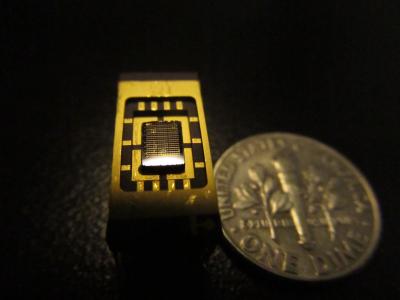A research team at the School of Engineering of Stanford has developed a superfast nanoscale light emitting diode (LED), which consumes very minimal power when compared to laser-based devices and is capable of transmitting data at a speed of 10 billion b/s paving the way to offer low power, ultrafast light sources for transmitting on-chip computer data.
 This chip carrier holds a chip with hundreds of the Stanford low-power LEDs at its center (Credit: Jan Petykiewicz, Stanford School of Engineering)
This chip carrier holds a chip with hundreds of the Stanford low-power LEDs at its center (Credit: Jan Petykiewicz, Stanford School of Engineering)
The research team comprising Jelena Vuckovic and Gary Shambat has reported about their device in the Nature Communications journal. Earlier this year, Vuckovic had developed a highly efficient, ultrafast nanoscale laser but it can function only at temperatures lower than 150° K, which makes it unsuitable for commercial applications.
The nanophotonic, single-mode LED functions at room temperature, which marks a major milestone in the development of future-generation computer processors. The single-mode LED is a unique diode that releases a single wavelength of light like a laser. The research team’s technology is based on nanophotonics. The team has introduced tiny isles of indium arsenide in the core of its device and the material generates light during the passage of electricity.
The indium arsenide isles are bounded by photonic crystal, which is an arrangement of small holes etched on a semiconductor. The photonic crystal acts like a mirror and reflects the light towards the device’s center, trapping it within the LED and causing light resonance at a single frequency.
Current systems have a laser as well as an exterior modulator and both these devices need electricity. The nanoscale LED integrates light generation and modulation functions in a single device so that it consumes very low power. Vuckovic stated that the innovative LED’s energy efficiency is 2,000 to 4,000 folds better than that of current devices.